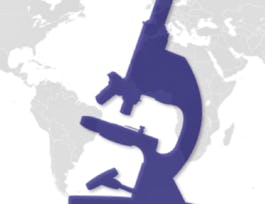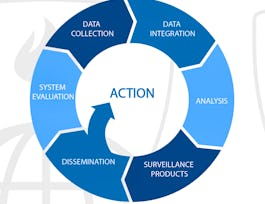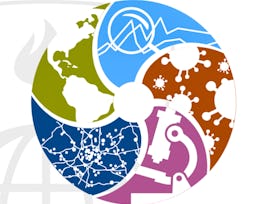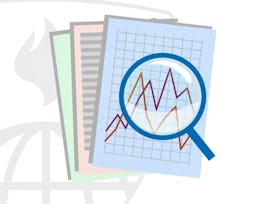In order to make a difference in the health and well-being of a population, we must understand the burden of all problems and conditions that affect the population, as well as how well our efforts to mitigate these problems are actually working. This course provides you with some essential skills and tools that will enhance your ability to describe and understand the health of your community. The tools that epidemiologists use are in fact useful for all public health practitioners, including data scientists, program officials, agency leaders, and policymakers. Whether you are deeply enmeshed in your career and looking to augment your skills, or are looking to change career paths into the field of public health, this course will give you some of the practical knowledge and skills that we hope you can apply in your professional endeavors.


Essential Epidemiologic Tools for Public Health Practice
This course is part of Epidemiology in Public Health Practice Specialization
Taught in English
Some content may not be translated

Instructor: Aruna Chandran, MD, MPH
52,021 already enrolled
Included with 
Course
(2,885 reviews)
98%
What you'll learn
Be conversant in public health history, services, governance, and workforce.
Perform numeric estimates to assess public health problems and evaluate the burden of a condition in a population
Use data visualization as an epidemiological tool to describe risk factors
Apply basic mapping skills and a tool for epidemiologic descion-making
Details to know

Add to your LinkedIn profile
4 quizzes
Course
(2,885 reviews)
98%
See how employees at top companies are mastering in-demand skills

Build your subject-matter expertise
- Learn new concepts from industry experts
- Gain a foundational understanding of a subject or tool
- Develop job-relevant skills with hands-on projects
- Earn a shareable career certificate


Earn a career certificate
Add this credential to your LinkedIn profile, resume, or CV
Share it on social media and in your performance review

There are 4 modules in this course
We will start by discussing the definitions of public health and epidemiology and discuss what components of individuals and their lives that we must address in order to optimize their health and well-being. In this section, we will also introduce the hands-on exercise for this course.
What's included
7 videos1 reading1 quiz
In this module, we will examine the definitions for and sources of the core numeric values we need to describe the health and well-being of a population, which are numerators, the counts of an event or disease, and the denominator, the population from which events are drawn. We will then manipulate those numbers to derive ratios, proportions, and rates, which are core measures used to describe the burden of public health problems.
What's included
5 videos1 quiz
In this module, we will explore the tool of data visualization, understand basic components of effective visualizations, and walk through practical exercises of identifying strengths and weaknesses of specific visualizations towards meeting their stated goals. You will then have the opportunity to create a data visualization from data regarding risk factors for common public health problems using the global disease-burden database of the Institute for Health Metrics and Evaluation.
What's included
4 videos1 quiz
Maps and geographic information systems have become a cornerstone in public health and epidemiologic work in all communities. In this module, we will discuss how place matters in public health and how understanding the geographic distribution of a disease or risk factor is an important component of designing appropriate interventions. We will then discuss GIS as a tool for displaying spacial data and conduct a detailed exploration of how spatial data is stored and displayed by GIS software. You will download an open source GIS application known as QGIS, extract both spatial and epidemiologic data from the US Census Bureau, and create a map of your own.
What's included
5 videos1 reading1 quiz
Instructor

Offered by
Recommended if you're interested in Public Health

Johns Hopkins University

Johns Hopkins University

Johns Hopkins University

Johns Hopkins University
Why people choose Coursera for their career




Learner reviews
Showing 3 of 2885
2,885 reviews
- 5 stars
75.31%
- 4 stars
20.46%
- 3 stars
3.01%
- 2 stars
0.76%
- 1 star
0.45%
New to Public Health? Start here.

Open new doors with Coursera Plus
Unlimited access to 7,000+ world-class courses, hands-on projects, and job-ready certificate programs - all included in your subscription
Advance your career with an online degree
Earn a degree from world-class universities - 100% online
Join over 3,400 global companies that choose Coursera for Business
Upskill your employees to excel in the digital economy
Frequently asked questions
Access to lectures and assignments depends on your type of enrollment. If you take a course in audit mode, you will be able to see most course materials for free. To access graded assignments and to earn a Certificate, you will need to purchase the Certificate experience, during or after your audit. If you don't see the audit option:
The course may not offer an audit option. You can try a Free Trial instead, or apply for Financial Aid.
The course may offer 'Full Course, No Certificate' instead. This option lets you see all course materials, submit required assessments, and get a final grade. This also means that you will not be able to purchase a Certificate experience.
When you enroll in the course, you get access to all of the courses in the Specialization, and you earn a certificate when you complete the work. Your electronic Certificate will be added to your Accomplishments page - from there, you can print your Certificate or add it to your LinkedIn profile. If you only want to read and view the course content, you can audit the course for free.
If you subscribed, you get a 7-day free trial during which you can cancel at no penalty. After that, we don’t give refunds, but you can cancel your subscription at any time. See our full refund policy.

